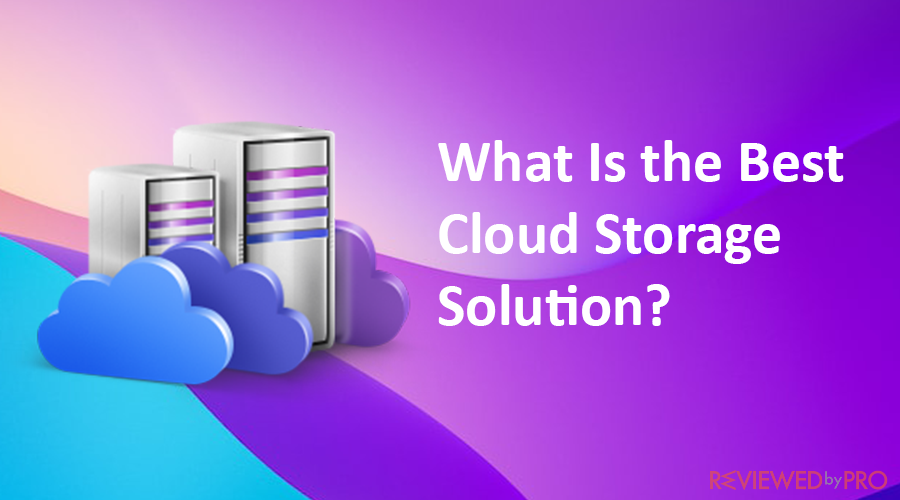
Cloud storage enables users to store their files on an online drive, granting them the ability to access their documents from anywhere with an internet connection. It serves as a valuable backup solution in case the local copies of files are lost or damaged. With automatic file syncing, modifications made to a local file are automatically updated in the cloud.
Most cloud storage services provide user-friendly apps or web interfaces, ensuring convenient access to files regardless of the user's location. This proves beneficial for individuals who frequently work remotely, allowing them to retrieve their files from any computer or device.
To ensure data safety, cloud storage providers maintain a vast network of servers distributed globally, offering redundancy. Unlike storing data solely on a single drive, such as a personal computer or electronic device, the data remains secure even in the event of a hard drive failure.
In this article, we will explore the top 5 cloud storage services, examining their features and offerings. These services typically provide both free and paid tiers, with the paid options often including additional services. Let's delve into the distinctive features offered by each provider.
-
Google Drive: Google Drive offers a generous amount of free storage space and seamless integration with other Google services, making it a popular choice for users already within the Google ecosystem.
-
Dropbox: Dropbox is known for its user-friendly interface and ease of use. It offers reliable cloud storage and collaboration features suitable for both personal and business use.
-
Microsoft OneDrive: OneDrive is integrated with Microsoft Office applications, making it a convenient choice for users who heavily rely on Microsoft software and services. It offers competitive storage plans and seamless integration with Windows devices.
-
Apple iCloud: iCloud is Apple's cloud storage solution, tightly integrated with Apple devices and services. It provides seamless synchronization across Apple devices and offers additional features such as device backup and iCloud Drive file storage.
-
Amazon S3: Amazon Simple Storage Service (S3) is a robust cloud storage solution designed primarily for developers and businesses. It offers scalable storage options, high availability, and durability for various use cases.
It's essential to assess your specific requirements, such as storage capacity, security features, collaboration tools, ease of use, platform compatibility, and pricing, when choosing the best cloud storage solution for your needs. Additionally, staying up to date with the latest reviews and comparisons of cloud storage providers can help you make an informed decision based on the current offerings in the market.
How to choose the best cloud solution?
Choosing the best cloud solution requires careful consideration of several factors to ensure it aligns with your specific needs and preferences. Here are some key aspects to consider when selecting a cloud solution:
-
Purpose and Use Case: Determine the purpose for which you require cloud storage. Are you looking for personal use, business use, or a combination of both? Consider the specific features and functionalities you need, such as file storage, collaboration tools, backup and restore capabilities, scalability, and integration with other applications.
-
Storage Capacity: Assess your storage requirements, both current and potential future needs. Evaluate the available storage options offered by cloud providers and ensure they offer sufficient space to accommodate your data without incurring additional costs or limitations.
-
Security and Privacy: Data security is of utmost importance when choosing a cloud solution. Look for providers that offer robust security measures, such as encryption of data in transit and at rest, multi-factor authentication, access controls, and compliance with relevant data protection regulations. Consider the provider's reputation for data privacy and their track record in handling security incidents.
-
Reliability and Uptime: Check the reliability and uptime guarantees provided by the cloud provider. Look for details on their infrastructure, data redundancy, backup mechanisms, and disaster recovery plans to ensure your data will be available when you need it.
-
Scalability and Flexibility: Consider your future needs for scaling storage capacity or adding additional services. Choose a cloud solution that allows for easy scalability without disruptions to your operations. Additionally, assess if the provider offers a range of plans or packages that can be tailored to your specific requirements.
-
Integration and Compatibility: Evaluate the compatibility of the cloud solution with your existing systems, applications, and devices. Seamless integration with your workflow and preferred tools can enhance productivity and streamline operations.
-
User Experience and Ease of Use: A user-friendly interface and intuitive features can significantly impact your experience with the cloud solution. Consider the ease of uploading, accessing, and managing files, as well as the availability of mobile and desktop applications.
-
Support and Customer Service: Research the level of customer support provided by the cloud provider. Check for available support channels, response times, and the provider's reputation for prompt and helpful assistance.
-
Pricing and Cost: Compare pricing structures and plans offered by different cloud providers. Consider the cost implications for storage capacity, additional features, data transfer, and any potential extra fees. Assess whether the pricing aligns with the value and benefits you expect to derive from the cloud solution.
-
Reviews and Recommendations: Read reviews and seek recommendations from trusted sources or peers who have experience with the cloud solutions you are considering. Their insights can provide valuable perspectives and help you make an informed decision.
By carefully evaluating these factors and considering your specific requirements, you can choose the cloud solution that best meets your needs in terms of functionality, security, scalability, compatibility, and cost-effectiveness.
Pros and Cons of cloud solutions
Pros:
-
Flexibility and Scalability: Cloud solutions offer scalability, allowing you to easily adjust your storage capacity, computing resources, and services based on your needs. You can scale up or down as your requirements change without significant upfront investments.
-
Cost Savings: Cloud solutions often operate on a pay-as-you-go model, allowing you to pay only for the resources and services you use. This eliminates the need for large upfront investments in infrastructure and hardware. Additionally, you can save on maintenance and operational costs as the cloud provider handles the infrastructure management.
-
Accessibility and Collaboration: Cloud solutions enable easy access to your data and applications from anywhere with an internet connection. This allows for remote work, collaboration among team members, and sharing of files and resources in real time.
-
Data Backup and Recovery: Cloud providers typically offer automated data backup and disaster recovery mechanisms. Your data is stored redundantly across multiple servers, reducing the risk of data loss. In case of any unforeseen events, you can quickly restore your data and minimize downtime.
-
Security: Cloud providers invest in robust security measures to protect your data. They implement encryption, access controls, authentication mechanisms, and regular security updates to safeguard your information. They also employ teams of experts dedicated to monitoring and mitigating security threats.
Cons:
-
Dependence on Internet Connection: Cloud solutions heavily rely on internet connectivity. If you have a slow or unreliable internet connection, accessing and working with your data in the cloud may be challenging or slower than desired.
-
Data Privacy and Security Concerns: While cloud providers implement strong security measures, some individuals and organizations may have concerns about data privacy and the potential for unauthorized access. Compliance with data protection regulations and proper encryption practices can help mitigate these concerns.
-
Downtime and Service Outages: Although cloud providers strive for high uptime, occasional service outages and downtime can occur. This can temporarily disrupt access to your data and services, impacting productivity.
-
Vendor Lock-In: Moving data and applications between different cloud providers or migrating back to on-premises systems can be complex and time-consuming. It's important to carefully consider the terms of service and exit strategies provided by the cloud provider to avoid vendor lock-in.
-
Limited Control and Customization: Cloud solutions offer standardized services, which may limit your ability to customize the infrastructure and software according to your specific requirements. You may need to adapt your processes and workflows to fit within the constraints of the cloud provider's offerings.
-
Potential Long-Term Costs: While cloud solutions can provide cost savings in the short term, depending on your usage patterns and storage requirements, long-term costs may accumulate. It's important to regularly evaluate and optimize your cloud usage to avoid unnecessary expenses.
It's worth noting that the pros and cons can vary depending on the specific cloud solution and provider you choose. It's crucial to carefully assess and compare different options based on your unique needs and considerations.




